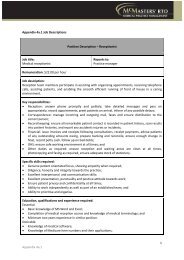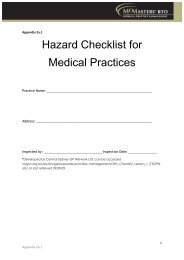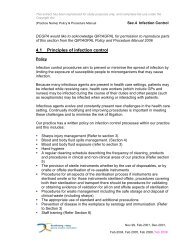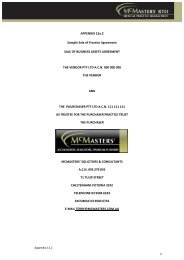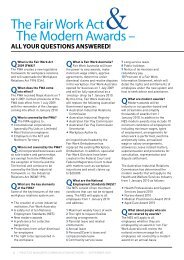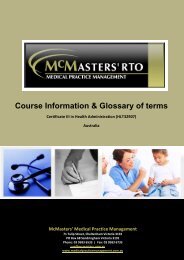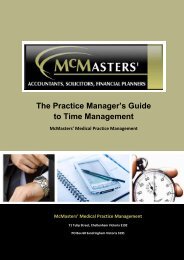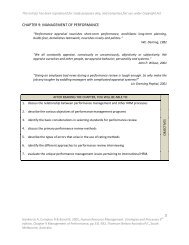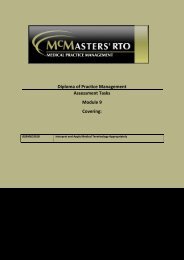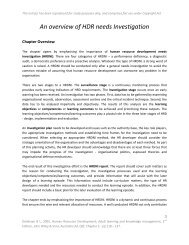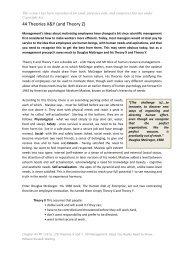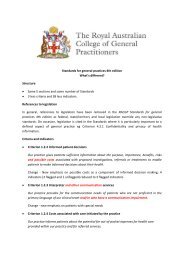This article has been reproduced for study purposes only, and ...
This article has been reproduced for study purposes only, and ...
This article has been reproduced for study purposes only, and ...
You also want an ePaper? Increase the reach of your titles
YUMPU automatically turns print PDFs into web optimized ePapers that Google loves.
<strong>This</strong> <strong>article</strong> <strong>has</strong> <strong>been</strong> <strong>reproduced</strong> <strong>for</strong> <strong>study</strong> <strong>purposes</strong> <strong>only</strong>, <strong>and</strong> comprises fair use under Copyright Act<br />
Clear <strong>and</strong> Present Danger – 17 December 2008<br />
Christmas is a time <strong>for</strong> giving <strong>and</strong> receiving — unless, of course, you are a GP. By Heather Ferguson<br />
IMAGINE the look on the GP’s face when he unwrapped a rather unusual gift from a grateful patient.<br />
There’s no doubt the sentiment was genuine — the GP had looked after the woman during her<br />
prolonged convalescence from a total knee replacement, including several after‐hours home visits.<br />
As a token of her thanks the patient presented the GP with a large, yellow cuckoo clock.<br />
The GP contacted his medical defence organisation, MDA National, concerned that the gift could<br />
alter the doctor‐patient relationship <strong>and</strong> create an expectation the patient would receive special<br />
treatment.<br />
He was also concerned that accepting the clock would breach his medical board’s code of conduct,<br />
which states GPs should not accept gifts or other inducements. And then there was the matter of<br />
aesthetics — the clock was very ugly.<br />
Dr Sara Bird, medicolegal claims manager <strong>for</strong> MDA National, says the GP was advised it would be<br />
reason able to return the clock to the patient, explaining that he was unable to accept the gift<br />
because it may be in breach of his professional <strong>and</strong> ethical obligations.<br />
But the GP did not want to upset the patient by returning the gift. He wanted to offer to pay the<br />
patient <strong>for</strong> the gift but was worried the clock may have <strong>been</strong> quite expensive.<br />
“MDA National advised the GP not to pay <strong>for</strong> the clock <strong>and</strong> recommended that he politely return it<br />
to the patient as soon as possible,” Dr Bird says. “The GP said that he would consider this advice <strong>and</strong><br />
then decide what to do.”<br />
A few weeks later the GP phoned back to say he had attempted to resolve the situation by offering<br />
to pay the patient <strong>for</strong> the clock.<br />
“Fortunately, the patient had refused payment <strong>and</strong> a compromise was reached whereby the patient<br />
decided to donate the clock to the local charity shop,” Dr Bird says.<br />
“The GP said that he was very happy with the resolution of the matter <strong>and</strong> noted, in passing, that<br />
the cuckoo clock remained in the charity shop’s window.”<br />
Aesthetic sensibilities aside, the GP had good reason to be hesitant about accepting an expensive<br />
gift. To do so could breach his medical board’s code of conduct <strong>and</strong> the Australian Medical Council’s<br />
draft code, Good Medical Practice. It states that doctors “must not encourage patients to give, lend<br />
or bequeath money or gifts that will benefit you directly or indirectly”.<br />
All MDOs advise against accepting expensive gifts from patients.<br />
Ferguson H, 2008, Australian Doctor, Clear <strong>and</strong> present danger, 17 December 2008
Dr Paul Nisselle, general manager of clinical risk management with Avant, says it’s a line GPs<br />
shouldn’t cross. He says examples of inappropriate gifts have included expensive wine <strong>and</strong> use of a<br />
holiday apartment.<br />
“It would be boorish not to accept a small box of chocolates from a pensioner patient. It would be a<br />
boundary violation to accept a bottle of Grange,” he advises.<br />
“Accepting a gift may suggest a willingness to move from a purely professional relationship to<br />
something else.”<br />
Dr Nisselle also advises against GPs giving presents to patients.<br />
“If you give a gift to some patients, what are your selection criteria? What does that signal about the<br />
relationship?”<br />
But that doesn’t mean GPs can’t do something to make a patient feel special.<br />
When he was in practice, Dr Nisselle made a point of taking his then pre‐teen children to visit a<br />
couple of his nursing patients on Christmas Day. The patients had no relatives <strong>and</strong> were not<br />
cognitively impaired. Dr Nisselle <strong>and</strong> his children would take some chocolates <strong>and</strong> perhaps some<br />
flowers or a small pot plant <strong>for</strong> the patients.<br />
“That was in part a learning experience <strong>for</strong> my kids, who would be coming straight from opening<br />
pressies to see another side to Christmas, <strong>and</strong> in part to let the patients know that someone was<br />
thinking of them,” he says.<br />
“I think that’s different to giving gifts more generally.”<br />
The RACGP <strong>has</strong> a less prescriptive approach to receiving gifts. It doesn’t consider it unethical <strong>for</strong> GPs<br />
to receive gifts from patients or their family <strong>and</strong> friends, although it does state that such gifts should<br />
not impact in any way on the doctor‐ patient relationship.<br />
The college says because general practice is an ethical profession, GPs must act in the best interests<br />
of their patients.<br />
RACGP president Dr Chris Mitchell says gifts can also be a poignant link to patients who are no<br />
longer around.<br />
“A few years ago I was given a beautiful painting from a patient I had diagnosed with a terminal<br />
cancer,” he says. “The artist had escaped from Russia <strong>and</strong> had used this work to gain entrance to a<br />
Paris school of art.<br />
“It was a wonderful <strong>for</strong>est scene of country he had walked through on his way out, with everything<br />
he owned on his back, including his paint brushes. It hangs over my fireplace as a reminder to me of<br />
a wonderful man.”<br />
Professor Claire Jackson, a member of the RACGP Queensl<strong>and</strong> faculty board, says her most<br />
memorable gift from a patient doesn’t bring back such happy memories.<br />
Ferguson H, 2008, Australian Doctor, Clear <strong>and</strong> present danger, 17 December 2008
At first the gift had all the hallmarks of proving worthy of fond anecdotes: a patient had shot a duck<br />
<strong>for</strong> her <strong>and</strong> Professor Jackson was looking <strong>for</strong>ward to serving it <strong>for</strong> Christmas dinner.<br />
“I cooked it with all this care but it was horrible <strong>and</strong> full of buckshot,” she says.<br />
“So <strong>for</strong> Christmas I gave my family lead poisoning. [If I had known] I would have just given up <strong>and</strong> left<br />
it in the bin at work.”<br />
On reflection, Professor Jackson thinks her patient may have shot the un<strong>for</strong>tunate fowl — which she<br />
had to pluck — in a Brisbane sub urban park.<br />
“The patient was a delightful guy … but he had a significant drug problem <strong>and</strong> the duck was clearly<br />
shot by an amateur person,” she says.<br />
RDAA president Dr Nola Maxfield <strong>has</strong> also had some dubious experiences with gifts of food.<br />
“I had one elderly man who insisted on bringing preserves he’d made himself,” she says. “The <strong>only</strong><br />
problem is the date they were made was usually two years be<strong>for</strong>eh<strong>and</strong>. I used to thank him very<br />
kindly, then take them home <strong>and</strong> put them in the compost.<br />
“I had another man who used to bring me a fruit cake he’d made himself. He’d tell me how during<br />
the year he’d marinate the fruit in alcohol <strong>for</strong> months on end.”<br />
But Dr Maxfield, who practises in Wonthaggi in Victoria’s south Gippsl<strong>and</strong> region, says home‐made<br />
gifts are the most touching because they show the patient <strong>has</strong> thought about you.<br />
She fondly recalls a load of seedlings she received <strong>for</strong> her vegie garden, all nicely labelled.<br />
On another occasion a small gift of flowers proved to be particularly touching.<br />
“An older lady came back <strong>for</strong> the results of her CT scan,” Dr Maxfield says. “Obviously she knew they<br />
were not going to be good but she still gave me a posy of flowers from her garden.”<br />
AMA president Dr Rosanna Capolingua says one year “dozens <strong>and</strong> dozens” of petunia seedlings were<br />
left at her front door on Christmas Eve. There were so many trays of seedlings that Dr Capolingua<br />
was able to plant a large, colourful show in her front <strong>and</strong> back gardens.<br />
“My garden was absolutely florid with colour. It was just gorgeous,” she says.<br />
However, Dr Capolingua says she usually feels uncom<strong>for</strong>table being given gifts because she believes<br />
it is a gift that a patient wants to come to see you.<br />
“I know it sounds corny but it’s true.”<br />
But <strong>for</strong> other GPs, Dr Capolingua says the AMA’s position on receiving gifts depends on the scenario<br />
<strong>and</strong> the gift. For example, if a male patient offered a gift to a female doctor <strong>and</strong> there were<br />
indications the patient was attracted to the doctor it would be wise to refuse.<br />
“I know of instances … where colleagues have refused to accept gifts presented on that basis,” she<br />
says. “But in general cases where the patient <strong>has</strong> given a gift that is not of monetary value … then<br />
sometimes you have to be humble <strong>and</strong> accept the gift.”<br />
Ferguson H, 2008, Australian Doctor, Clear <strong>and</strong> present danger, 17 December 2008
OVERSEAS GIFTS<br />
Associate Professor John Gullotta, Sydney GP <strong>and</strong> federal AMA councillor<br />
Professor Gullotta <strong>has</strong> received his share of overseas souvenirs ‐‐ tea towels, pens <strong>and</strong> even a bust of<br />
Hippocrates from Greece. There's also <strong>been</strong> a steady stream of homemade cakes, chocolates <strong>and</strong><br />
biscuits to keep up his calorie intake.<br />
"However, being [of] Sicilian heritage <strong>and</strong> having many patients from Italy I am proudly given a<br />
selection of home‐grown vegetables, eggs <strong>and</strong> fruit, which are very yummy <strong>and</strong> good <strong>for</strong> you as<br />
well," Professor Gullotta says.<br />
But he could happily do without the "rocket fuel" ‐‐ homemade wine <strong>and</strong> spirits.<br />
"Some can be very good <strong>and</strong> very palatable. [Un<strong>for</strong>tunately], the majority of batches ... have a much<br />
better purpose as drain cleaner."<br />
FEW AND FAR BETWEEN<br />
Dr John Hall, GP in Oakey, Queensl<strong>and</strong><br />
DR Hall's patients have no excuse <strong>for</strong> <strong>for</strong>getting his name, thanks to one of his more creative<br />
patients.<br />
"I have a very elaborate carving on my desk … with my name [carved <strong>and</strong> painted] in gold. It looks<br />
like one of those Indonesian carvings," he says. "Apparently [the patient] made one <strong>for</strong> all new<br />
doctors who came to the practice."<br />
However, Dr Hall, says he doesn't get many presents.<br />
"I get the odd jar of pickles. I also got a case of wine from someone at a local winery [whom I treated<br />
<strong>for</strong>] pneumonia.<br />
"Maybe [gifts were] more common in the days be<strong>for</strong>e Medicare when if someone could not af<strong>for</strong>d<br />
to pay they'd bring vegies or a pig."<br />
CLEAR GUIDELINES<br />
Dr Christine Boyce, Lenah Valley, Hobart<br />
Dr Boyce gives her patients clear instructions about what she can accept as gifts, usually restricting<br />
them to some edible goodies at Christmas or home‐grown flowers, fruit or vegetables.<br />
But when she turned 40 she was willing to accept a more unusual present from one patient.<br />
"I had this lovely African lady as a patient who always had these henna tattoos when she came in<br />
<strong>and</strong> I was <strong>for</strong>ever telling her how much I admired them," Dr Boyce says.<br />
Ferguson H, 2008, Australian Doctor, Clear <strong>and</strong> present danger, 17 December 2008
"She said she would do one <strong>for</strong> me, but until my 40th birthday I had no real occasion where I<br />
thought I would be sporting a henna tattoo. I had a dress‐up birthday [party] <strong>and</strong> I had a sari …<br />
which I thought the henna tattoo would go really well with."<br />
Dr Boyce <strong>and</strong> her daughter went around to the patient's home <strong>and</strong> had a nice time while the tattoo<br />
was applied to her arm <strong>and</strong> h<strong>and</strong>.<br />
"It was just beautiful," Dr Boyce says.<br />
The tattoo lasted <strong>for</strong> a couple of weeks <strong>and</strong> proved an ideal way to help increase tolerance <strong>and</strong><br />
underst<strong>and</strong>ing of other cultures.<br />
"I got lots of comments <strong>and</strong> questions [from other patients], so it was a good conversation starter<br />
about patients from other cultures," Dr Boyce says.<br />
NOTHING BEATS A THANK YOU LETTER<br />
Dr John Kastrissios, GP in Springwood, outer Brisbane<br />
KNOWN as JK or Dr John to his patients, Dr Kastrissios is still waiting to be offered an exotic car as a<br />
gift. "I would love to be given a Ferrari but I don't think I would be able to accept it," he jokes.<br />
Dr Kastrissios, this year's winner of the John Aloizos medal <strong>for</strong> outst<strong>and</strong>ing contribution to the<br />
division's network, says his practice receives the usual alcohol <strong>and</strong> chocolates as well as homecooked<br />
meals <strong>and</strong> ethnic foods.<br />
"The funniest things are T‐shirts with various colourful slogans," he says. "One had anatomical<br />
pictures on it to assist me with my diagnoses."<br />
The T‐shirts create a bit of fun <strong>and</strong> laughter in practice. Dr Kastrissios <strong>has</strong> worn them on dress‐down<br />
days, covering up with another shirt <strong>for</strong> the few patients who may not appreciate the humour.<br />
He also made sure he wore the anatomical shirt on the day he per<strong>for</strong>med a procedure on the patient<br />
who gave it to him.<br />
"She thought it was extremely funny."<br />
But the presents Dr Kastrissios treasures the most are letters.<br />
"The best thing is people who write thanking you <strong>for</strong> looking after them," he says.<br />
Ferguson H, 2008, Australian Doctor, Clear <strong>and</strong> present danger, 17 December 2008



